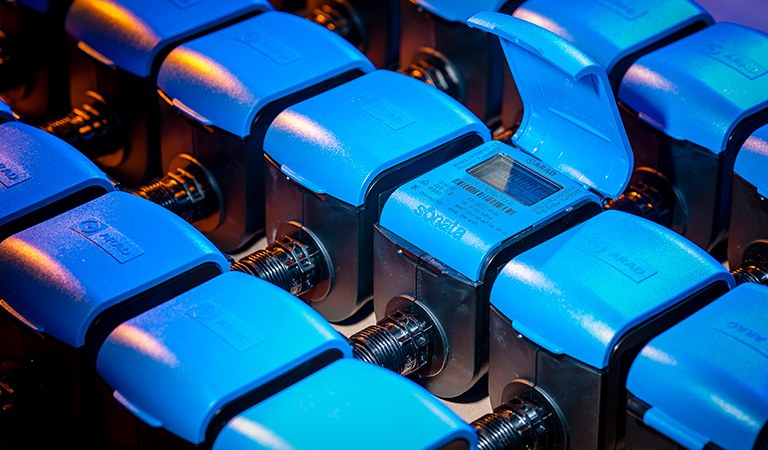As part of our iSIM campaign at Mobile World Live with our partners Kigen and Vodafone Business, we interviewed the CEO of the Arad Group, one of our key customers in the smart metering market, to get a technologists’ view of the integrated SIM (iSIM).
About the Arad Group
Established in 1941, The Arad Group is a world leader in water measurement solutions and services, specializing in designing, developing, and manufacturing high-quality water meters and advanced metering infrastructure systems.
Today, it is a global corporation with a strong local presence in Europe, North America, South America, China, and Israel. Focusing on AMI (Advanced Metering Infrastructure) and AMR (Automatic Meter Reading) water metering solutions, Arad has already deployed millions of smart water meters worldwide and delivers an end-to-end solution for smart water management in today’s smart cities. In order to maintain its leading position, Arad is investing a large proportion of its annual revenues in R&D to ensure their customers benefit from the most advanced water metering technology available in the market.

What are the challenges you are solving for your customers?
Our clients mainly include water utilities around the globe that provide water to residential areas and are looking for high reliability and accurate measurement solutions. We help our customers lower the “waste of water” which is the difference between the amount of water provided by the utility and the amount that is billable to the end customer.
In addition, Arad’s advanced smart metering infrastructure provides 24/7 monitoring for leaks and breaches, combined with advanced features like integrated pressure sensors – giving water utilities the ability to provide the best service to their customers.
In general, our R&D and operational challenge is to build affordable measuring devices that guarantee 10 to 15 years of real time constant unmanned service.
In terms of supply chain efficiency, the challenge is always to keep a minimum number of SKUs while managing different and sometimes changing regulations and communication protocols in each country.
Arad also plays a part in society. For example, in the face of the recent COVID-19 pandemic, Arad, in collaboration with the Israeli social services, initiated the “Living Water” program to use Arad’s advanced solutions to protect elderly, solitary people who don’t have frequent visits in their homes due to social distancing. In this program, we monitor the water consumption of these lonely individuals. If we detect a day without water consumption, Social Services are automatically alerted through the system. They then send a representative to check on the person’s condition before it is too late.
To recap: We provide the products and infrastructure to support a vital service – providing water to people’s homes. Our customers expect 100% reliability from a product that is exposed to harsh environmental conditions and that has to keep measuring accurately for 10 to 15 years. This needs to be done in a very cost-effective way to support large-scale deployment.
Where do you see the promise of iSIM and its potential for the Arad Group?
Fundamentally, we are looking for data integrity. It is crucial that the communication device in the field and the data measurements sent from it to the network can be trusted.
iSIM enables all of this, with additional benefits including saving Bill of Material costs by eliminating additional hardware components and increasing product reliability by eliminating the external SIM card or chip.
iSIM is also helpful with tackling another challenge. It reduces power consumption which is a critical aspect for us. As our product works with irreplaceable batteries, we need the power consumption to be as low as possible in order to increase the meter’s lifetime. The iSIM that is tightly integrated in the modem chipset already implements all the required low power modes and consumes less power than a standalone solution.
From a logistics perspective, as a corporation that operates globally, iSIM provides an opportunity to provision devices before being deployed – using one hardware SKU while supporting different carriers and countries.

Much like you, others might be wondering how they can choose between many confusing options. What questions should technologists be asking, to know that iSIM is the right choice for them?
From a technologist’s point of view, the fundamental question is whether their selected partners can offer a secure and approved SIM for their targeted carriers. Also, I would add that standardization efforts are in the right direction. As standards are currently being established, this will accelerate the rate of technology adoption by carriers and will encourage additional chipset makers to bring this technology to the market.